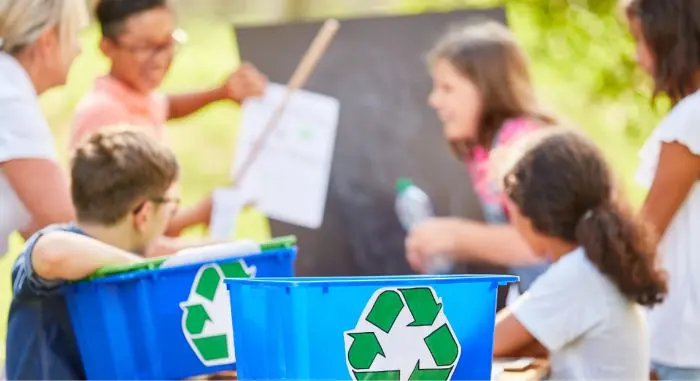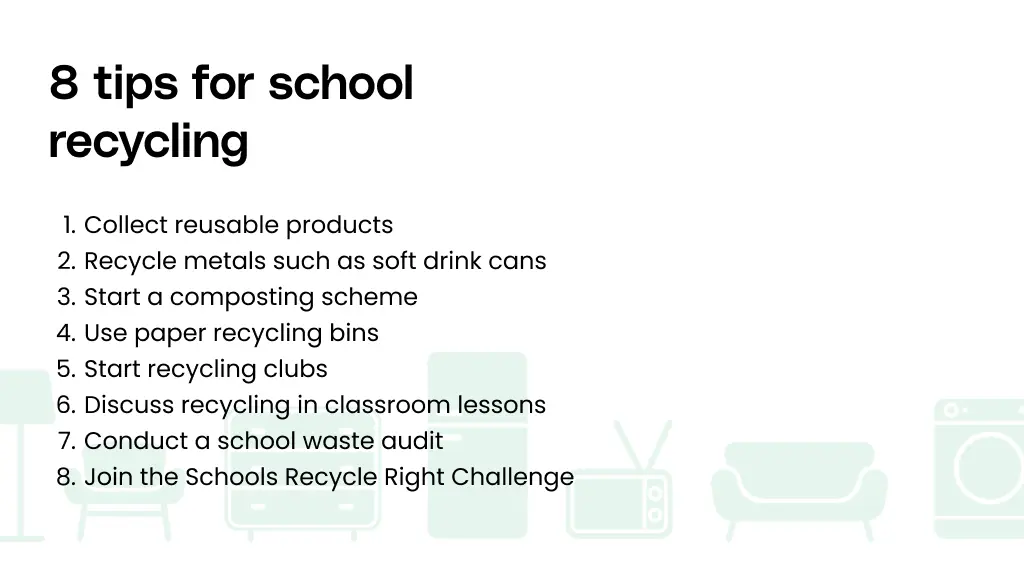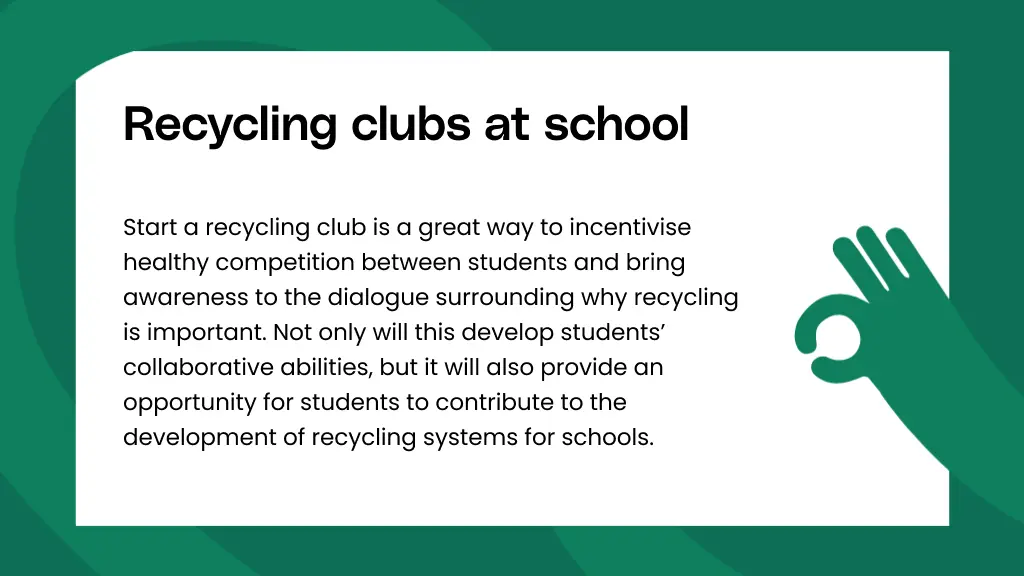

In 2021, the value of understanding and implementing recycling practices cannot be understated. One of the best ways to encourage recycling across a community, is to start by teaching the community’s youngest members at school!
Not only is recycling fantastic for the environment but adapting recycling habits can also save a school plenty of money that would otherwise be spent on waste disposal. Schools produce huge amounts of waste across things like food, electronics, paper and so much more. As such, it is important to develop effective recycling systems for schools.
Setting up a recycling system can be a hands-on, cross-disciplinary lesson that educates students about the environment, personal responsibility, community action, sustainability, and resource management. Classroom recycling projects can also allow the school to gain public recognition for its’ achievements.
If you’ve been wondering “how can we recycle at school?”, Ridly are here to assist you in setting up an effective school recycling policy and system. By following these 8 simple steps for school recycling, your school and local community will become more aware of the sustainability issues pressing our nation and become active participants in the movement to preserving our environment.
But first, let’s take a closer look at why recycling, particularly in communities and schools, is essential.
Why is School Recycling Important?
Before we discuss recycling systems for schools, it is crucial to understand why recycling is important.

Recycling works to reduce the amount of waste that builds up in landfills and extend the useful life of materials that would otherwise be disregarded. Landfill sites wreak havoc on natural wildlife and their habitats, contaminating water supply and impacting neighbouring communities. Thus, recycling is an important endeavour to undertake when considering how to reduce the acceleration of climate change. Likewise, recycling lessens greenhouse gas emissions and pollution, preserving natural resources and safeguarding the lifespan of our natural environment. Moreover, recycling provides raw materials for industries and creates job opportunities in local communities.
Within schooling environments, students and teachers can work collaboratively to help protect the environment by reducing waste and recycling. Classroom recycling projects will engage students with recycling and place a greater emphasis on its’ importance. Expressing the importance of recycling to children in their formative years is crucial for our fight against climate change.
8 Useful Tips for School Recycling
So, how can we recycle at school?
There are a bunch of fun, engaging and effective ways to practice sustainable waste disposal in schools – consider the following 8 school recycling tips to help improve your school’s recycling system.

1. Collect Reusable Products
One of the best ways to lessen your school’s carbon emissions and wastage is to encourage students to purchase and use reusable items. Students often throw away many study items that could actually be used again, such as papers, books, notebooks, and pens. This can be a waste of money on their side whilst simultaneously harming the environment.
Ridly recommends that teachers encourage their students to be mindful of their wastage and to purchase schooling appliances that have a long lifespan alongside continued engagement with school recycling policy. Furthermore, incentivising the considered use of materials and preservation of existing materials at school will develop positive recycling habits that’ll translate to the home environment.
2. Recycle Metals
Recycling metals can be performed at schools that have vending machines for soft drink cans. For this activity, you first have to get "author"ity from the council to place metal recycling bins near each vending machine.
Getting teachers and students involved in recycling activities at school can be educational, fun, and good for the environment all at once.
3. Start a Composting Scheme
Another simple measure that can be taken for healthy recycling habits at schools is the creation of a composting scheme. Local councils can provide compost bins for schools that can be used to collect common organic wastes such as tea bags, coffee, fruit scraps, vegetable scraps and more.
Place these compost bins near the cafeteria, canteen, or other high-traffic areas to help raise awareness for recycling among the student body. Compost bins are often free of charge – if you’d like to turn this one into a lesson, research worm farms and composting and have your pupils learn about the ins and outs of food and organic waste!
4. Use Paper Recycling Bins
Paper is the main form of waste in most Australian schools. Teachers should encourage their students to be mindful of how they use paper and how often they dispose of paper to develop positive waste habits. This can be done by placing paper recycling bins in every classroom. The quick build-up of paper in these bins will provide physical evidence of just how much waste can build up in a short span of time for students who otherwise might not be incentivised to recycle.
Note that these containers should be "label"led clearly so that students know where to put different types of waste in the classroom.
5. Start Recycling Clubs
Starting a recycling club is a great way to incentivise healthy competition between students and bring awareness to the dialogue surrounding why recycling is important. Not only will this develop students’ collaborative abilities, but it will also provide an opportunity for students to contribute to the development of recycling systems for schools.
Consider implementing fun and engaging activities like role-play to further engage the student body. Including games and challenges within the recycling club will engage students more so than not in recycling efforts. Students may like to get involved in making graphics for the recycling bins. Get them involved in promoting the recycling efforts around school within the newsletter or through posters placed around the school.

6. Discuss the Importance of Recycling in Classroom Lessons
Integrate discourse about recycling within classroom lessons and syllabus to keep the topic front of mind for all students. This will help them understand the importance of recycling and be more aware of the efforts in place around the school environment that they should engage with. This will also incentivise engagement with the development of recycling systems for schools across Sydney.
7. Conduct a School Waste Audit
A waste audit calculates the volume and type of waste a school generates. This is a powerful tool to identify the primary sources of waste in a school in order to target areas for change. To conduct a waste audit:
- "label" large buckets with respective waste categories
- Record the weight of each bucket and keep a tally of the number of buckets per category
- Get the students involved with sorting the waste
- Calculate the volume of waste
- Analyse and evaluate the results
- Propose strategies for reducing waste
8. Schools Recycle Right Challenge
Register your school for the ‘Schools Recycle Right Challenge’ run in October-November each year to access great waste reduction ideas for your school. Again, this will help incentivise friendly competition that’ll engage more students to participate in recycling efforts. This challenge offers a wide range of recycling themed activities, lesson plans and events ideas that have been developed explicitly for Australian schools.
Existing Recycling Systems for Schools
Schools can participate in many free recycling programs alongside their own recycling systems and practices in place. These include:
Battery World Schools Recycle Program
Battery World’s Schools Recycle Program offers a national opportunity for schools of Australia to recycle, or responsibly dispose of all types of used batteries. Recycling packages for schools are developed according to each school’s needs and can include web-based teacher resources, presentations at school assemblies, posters, information sessions for staff, battery recycling bins and mini recycling bins.
MobileMuster
MobileMuster provides an Australia-wide free recycling service for all types of mobile phones and mobile phone batteries, chargers, and accessories. This includes placing collection boxes around schools and distributing learning modules that can be used in the classroom to help students develop a better understanding of the recycling process.
Cartridges 4 Planet Ark
‘Cartridges 4 Planet Ark’ is an innovative recycling program that provides Australians with an easy, environmentally accredited way to recycle their used printer cartridges. This program also offers resources to help schools promote printer cartridge recycling. The participating manufacturers cover the cost of collecting, transporting, and recycling the cartridges. For a free collection box at your school, call 1800 24 24 73.
How Many Schools Recycle in Australia?
More and more Australian schools are implementing recycling systems for schools each year as the emphasis on sustainability and environmental preservation grows.
According to RecycleNow.com, the average secondary school produces 22kg of waste per pupil each year and the average primary school produces 45kg of waste per pupil each year. This is why Australia must implement recycling systems for schools across the board.
Our Stance on Recycling
At Ridly, we set the standard in effective, sustainable waste disposal and rubbish removal, preventing the use of landfill, and instead promoting the necessity of recycling. Our team are passionate about transforming sustainable standards and establishing them as the new norm for all rubbish removal jobs across Sydney.
Improper waste removal and handling of recyclable materials can result in significant complications. Take the hassle away from school rubbish removal including cardboard removal, by calling in the professionals; our same-day rubbish removal Sydney service is quick, convenient and efficient; we’ll do the job and be on our way with minimal disruption to your day. Ridly also provide leading household rubbish removal services and office waste disposal across Sydney’s Greater Region.
When you rely on Ridly for the collection and disposal of all recyclable materials and other waste from your school, rest assured you’re doing your bit for the environment. All you have to do is give us a call on 0491 181 130 and we’ll give you a free quote over the phone before sending out our experienced rubbish removal experts on the same day.